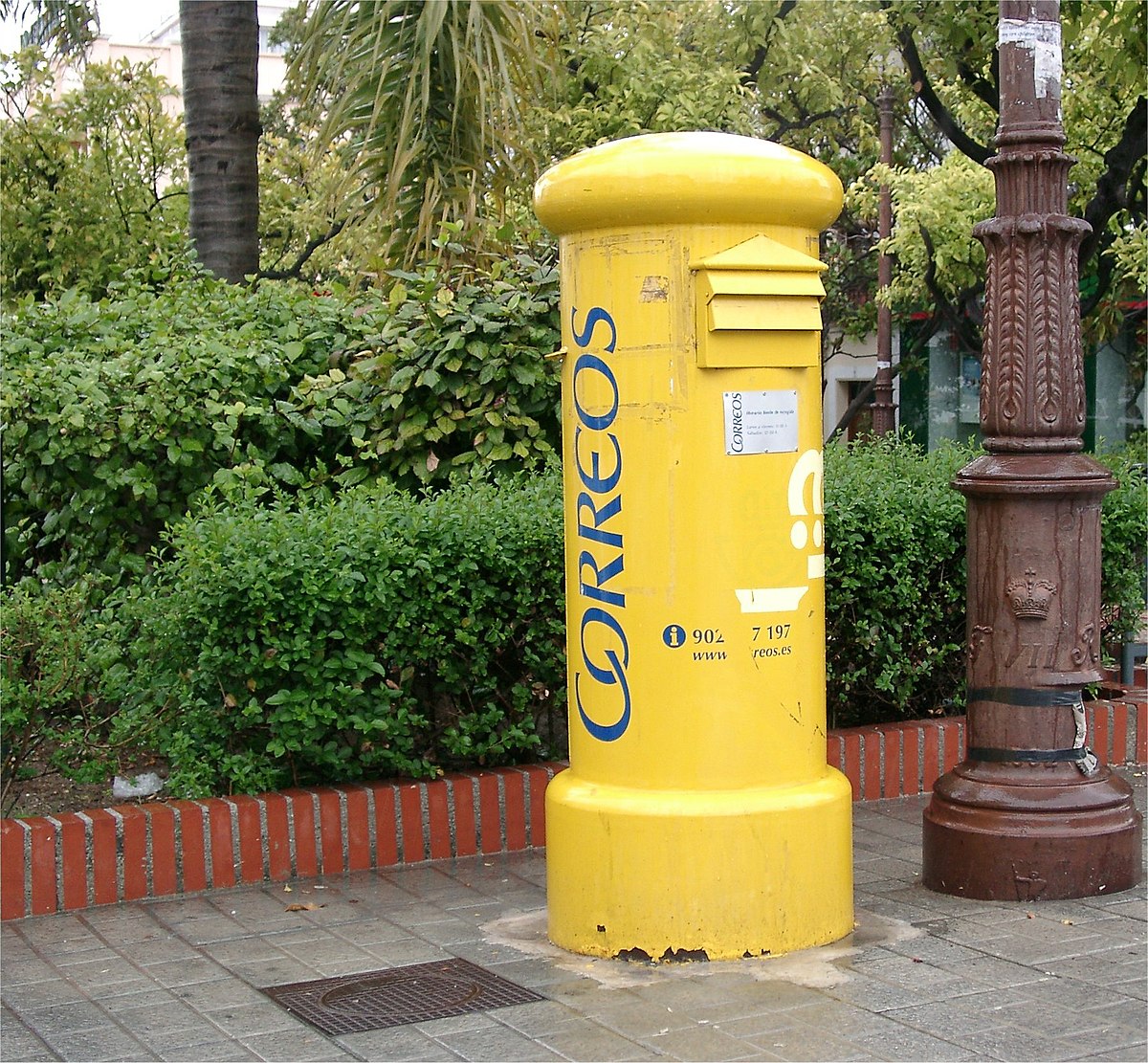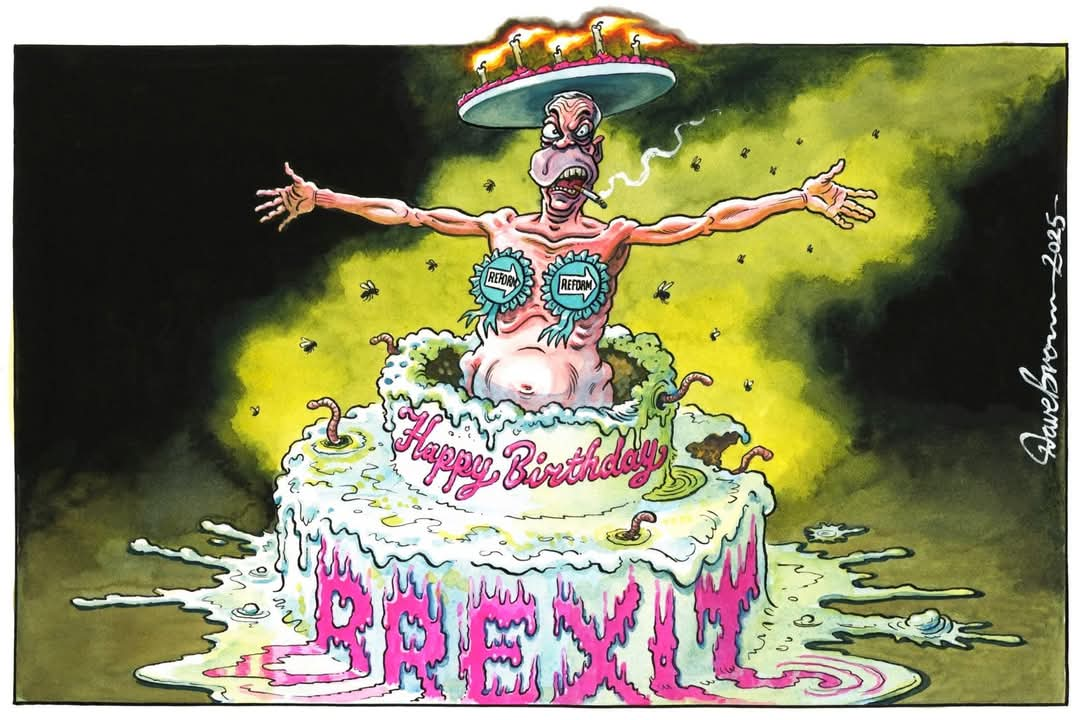Switching Sides
Monday, February 24, 2025
Things are moving fast, and many of us wake each morning wondering what’s the latest shock coming from the Land of the Free. We switch on the TV or check the news on our mobile phone. What on earth is the King of America – and his supporters – up to now? He seems to be breaking things randomly. Silly calls and plastic straws and then some deadly serious issues too. We wonder if we will survive his reign (and in the likely event that he doesn’t last his four years, his vice-president appears to look like being an exceedingly poor choice as his replacement).
We worry about our children and the grand-kids. They won’t have it as easy as we did.
In my own defence, I’ve spent several years in the USA: I love being there, I was married to a wonderful woman from California and two of our three children (all born in Spain) live there. If you are going to be a foreigner in Gringolandia, being a tall, handsome and well-spoken Brit is as good as it gets.
Let us look then at Spain’s relations with the USA (known here as Los EEUU).
Since the Spanish think of America as being everywhere from Chile to Canada, we call their people los estadounidenses, which is an ungainly word meaning the United-Statesians. Don’t wanna offend no salvadoreño, no.
The USA, a NATO member, maintain a couple of military bases in Spain – a naval base in Rota (Cádiz) and an air-force base in Morón de la Frontera (Seville), although Politico reports ‘American troops in Europe are not forever, US defence chief Hegseth warns. Donald Trump’s man in the Pentagon hints at major disruption to the continent’s 80-year-old protective security architecture’. Meanwhile, some of the lefties here shout: ‘Yankees go home’. Beware of what you wish for.
Spain’s main international disagreements with the Americans are not about their military presence here, but rather to do with Gaza, Cuba and Venezuela; and since Trump’s return, the Ukraine. The Spanish people’s first concern – on another phase of dismay – could well be the shocking American treatment of their Hispanic citizens and immigrants (legal or otherwise). 
Trump launched his first volley towards Spain right after his inauguration (‘Liberty Day’) by (probably) confusing the country as a member of the BRICS, the ‘emerging world economies’ that include Brazil, Russia and China. Maybe he thought the ‘S’ stood for Spain (rather than South Africa). We’re with the PIGS, remember?
Understandably, America’s policies don’t always dovetail with Spain’s – several times, they’ve sided with Morocco for instance.
Right now, there are important economic differences too. Congress wants to inflict tariffs (aranceles) on their trading partners, and an agreement that foreign traders won’t be subject to DEI policies (diversity, equity and inclusion) – which goes against Spanish and European law, social justice and common sense. "We want to ensure that our contracts comply with all U.S. federal anti-discrimination laws and that suppliers do not operate programs promoting diversity, equity, and inclusion that violate existing federal laws," U.S. embassy sources told the Spanish national broadcaster RTVE, as if distasteful Trumpian policies must automatically be observed by the rest of the Free World.
But if trade is one thing, then security is another. Could Trump bring us into a war? Or maybe, could Trump take a step back and bring the rest of us into a war? The Economist says ‘… the Ukraine is being sold out, Russia is being rehabilitated and, under Donald Trump, America can no longer be counted on to come to Europe’s aid in wartime…’
Nominally, or at least in pre-Trump times, ‘Spain and the United States are close allies and have excellent relations based on shared democratic values, including the promotion of democracy and human rights’, says the US Department of State. And maybe the coming breakdown stems in part from the Moncloa. A Spanish newspaper reports that ‘On Monday, Sánchez legitimizes Zelensky in Kiev and puts Spain in the way of both Trump and Putin. He offers his full support to the leader of Ukraine against these threats on the third anniversary of the invasion’. A second article – this time about the Middle East – highlights Spain’s opposition to the ludicrous plan to turn the land into a gaming resort: ‘Sanchez calls Trump's plan for Gaza “immoral”: and “Gaza belongs to the Palestinians”’, says the headline.
Elsewhere we read (in a blistering take-down of the American leader): ‘Trump's betrayal opens a window of opportunity for Sánchez. Although, what the Spanish president must avoid in any case is that an excessive desire to take political advantage of Trumpian exuberance ends up by seriously damaging our country’.
It would be good to read that Sánchez has the support of all Spaniards (and better still, all Europeans) in his crusade against the current American leader (and his partner Elon Musk), but of course, there’s the Partido Popular, who are always looking for an angle to somehow take centre stage, and then there’s the far-right (are we allowed to call them fascists?) represented by Vox. This weekend at the PSOE Regional Congress in Seville, Sánchez called on Núñez Feijóo to cease his policy of being ‘a collaborationist’ with the far-right, and urged the PP to clearly position itself in favour of Europeanism. "You can’t support Europe only on the even days of the month", he said.
From an editorial at elDiario.es, we read ‘…Trump's offensive against Ukraine has left the Partido Popular in an uncomfortable position. Its only reaction to the events in Washington has been to criticise Sánchez for standing out in his denunciation of the policies of the new US government. It is difficult to know the PP's position on international relations, beyond generalities, other than seeing the world through what Sánchez does’.
It’s true that Donald Trump has a few friends from Spain. The Vox leader Santiago Abascal f’rinstance. Even if Trump, at the CPAC (the annual ‘Conservative Political Action Conference’ held last weekend), salutes Abascal from the tribune by mangling his name as ‘San Diego Obascal’. They must be very close.
Elon Musk though, Donald’s first buddy, further encouraged Abascal when he said on Sunday that ‘Vox will for sure win Spain’s next elections’.
No doubt, there’s a lot he can do to help make that forecast come true.
 4
Like
Published at 8:32 PM Comments (18)
4
Like
Published at 8:32 PM Comments (18)
The Circle of Life
Monday, February 17, 2025
The Spanish voters are divided, as in most other countries where one is legally allowed to have an opinion, into the four blocks of far-left, left, right and far right. Even the small regional parties must march to this drum, while tending towards supporting the socialists in government (simply because the conservatives would consider their dissolution).
The old Ciudadanos party, which toothily claimed to be a centre party, was proved to be a crutch for the right, and it also showed us – once again – that no one wanted to be in the centre anyway.
My take is that the far left is, as always, too busy squabbling amongst themselves to ever get together to achieve much. They famously did it prior to and during the Civil War and (after being understandably quiet for the next forty years) haven’t achieved all that much since. The Conservative Media, the Judiciary, Church and Establishment all put a stop to their brightest star Pablo Iglesias – he of the ponytail – through lies, innuendo, bulos and lawfare.
In the socialist seats (a party with a lot of corruption cases in its history, particularly from Seville), another strong and intelligent man has risen to take the helm. He is truly a statesman and is well-considered in Europe, if less so here in Spain. Nevertheless, Pedro Sánchez and his government has done surprisingly well for the economy (rarely a strong point with the lefties) and is – compared with the other party bosses – the captain in the popularity stakes.
On the right, we have the party of Capital. Yet, they have a weak leader who is more prone to pointless attack than to mounting any useful opposition. The Right must defend the economy (and profits), but the economy is doing just fine. Could the PP do better in this important sphere? We remember the last time they were in power.
Alberto Núñez Feijóo’s party recently voted against the increase in pensions (no doubt in a gesture towards fighting against rising costs) and promptly got a Black Mark from Spain’s better than ten million pensioners, and was obliged to reverse course in a second vote just a week later. The point of chastising the government is not always going to play well with the ordinary folk queuing up outside the bank or the employment office.
The chances are good that Feijóo will anyway soon be deposed in favour of Isabel Díaz Ayuso or possibly Juanma Moreno (both currently nursing some problems of their own).
If supporters of the Partido Popular tend to think more of their wallets than they do of mine, then the Vox crowd have a different and far more negative agenda based on hatred, fear and jealousy. This party, which has a soft spot for General Franco (and his international equivalents today), is slowly growing in popularity and now stands at around 15% in the polls.
If the ragbag of far-left groups must support the PSOE to keep the wolf from the door, then the Voxxers will be vital in any future election to putting the PP into power, and their price will be high.
Right now, a small but symptomatic headline comes from a tiny village in the forgotten province of Zamora. It appears that no one has given birth in Vega de Villalobos in the last eighteen years, but now everyone there is thrilled by a Happy Event. The ninety-one residents of the village are said to be delighted.
But then a Vox deputy called Rocio de Meer (a good old Spanish family name if ever there was one) wrote on Twitter last week, as one does, complaining as usual about the foreign immigrants and to make her point she refers to the birth of the Vega de Villalobos child saying: ‘The future of Spain is dark’. See, the baby’s name is Ayoub (and not, I don’t know… Manolito). Worse still, she received 10,000 ‘likes’ for her efforts. The parents may be integrated, but they are still newcomers.
The leader of Vox is Santiago Abascal. He is also the president of ‘the Patriots for Europe’ clique in the European Commission and he has just held an international far-right fest in Madrid, with all the usual suspects in attendance, including Viktor Orban, Marine Le Pen, André Ventura, Matteo Salvini, Geert Wilders and Kevin Roberts, president of the sinister American Heritage Foundation (the ‘Project 25’ people).
Donald Trump received suitable adulation from all those present (as Europe waits for his tariffs to kick in).
The phrase Make Europe Great Again appeared on the rostrum during Vox’s ‘Cumbre de Patriotas’ (celebrating the utopian and largely fictionalised past of our continent, or are we thinking of Mussolini and his partners of ninety years ago?).
Apart from the music, I can’t think of a time when Europe was greater than it is now.
Thus Spain has its four political groups (plus some small and eccentric satellites). As for the large number of foreigners living in this marvellous country, 6,800,000 of us, well we don’t have the vote and, sad to say, we don’t count for much with the politicians.
Unless we misbehave of course.
Or have a baby.
 2
Like
Published at 6:49 PM Comments (0)
2
Like
Published at 6:49 PM Comments (0)
The Stamp Collector
Saturday, February 8, 2025
In the bad old days, the village postman wasn’t much good with foreign names (although he liked to collect stamps, sometimes removing them with a certain amount of bureaucratic relish from the corner of the envelope). It was no big deal: in those times, the twenty pound notes tenderly send by my dad’s sister would be folded inside within a sheet of carbon paper to fool the early X-Ray machines in Madrid.
I’d be sent to Old Martín with instruction to collect all the foreigners’ letters – at least those of the foreigners who were sat in the village square, drinking and gossiping.
It’s not as bad as it sounds.
The correos opened in those day at the reasonable hour of 3.00pm.
Anyone who wasn’t in the square drinking naturally risked losing his twenty quid.
It’s a far cry from today. Now we don’t know each other – there’re too many of us – and the post office wouldn’t give out the mail to some spotty foreign kid anyway. Now, it’s either delivered by a person dressed in a yellow uniform driving an equally buff-coloured three-wheel motorcycle, or its placed in a tin post-box and you come along during opening hours to see what – if anything – is new.
As for the folded twenty pound notes, now the British Government lets you take abroad as much as you like: to spend freely on rounds of brandy, weekends in a Parador or buying a second hand car with no MOT and the steering wheel on the wrong end of the dashboard.
Before they took to delivering the mail, I too had a post box: un apartado. Nº 35 it was. Then they started charging a heavy sum for its rental, insisted that each person who used the PO Box would have to pay separately for the same number, and they introduced (free) house deliveries anyway.
It was an easy call, although any letters which later arrived at my Nº 35 were solemnly returned to sender, unread.
I’m sure that as the result of the Person Unknown stamp on the repatriated item, the editors of my old school magazine were convinced that I had precipitously joined the list of ‘the dearly departed’.
Which, on the bright side, saved me continuing with my modest annual subscription.
The world moved on, and someone invented emails, which took the wind out of the sails of the Spanish postal system. Then along came DHL and their parcel-totting competitors, plus those fellows who whizz through the city traffic on their bicycles with an urgent message stuffed down their Velcro pouch.
The post office was on the ropes.
So it invented in own high-speed parcel delivery system, operated as a bank for a while, started to sell books by right-wing authors (have a look next time), sent and received money abroad, sold stickers, lottery coupons and magazines and generally moved, as they say, forward.
The postage stamps were another change. Instead of a stamp which one could lick and affix, the new ones have peel-off backs. Or, and more usually, they print out an inelegant sticky strip with numbers and bar-codes, and press it onto your envelope – as often as not hiding part of the first line of the address.
So today, I went to post a letter to foreign parts and said that I wanted a stamp rather than an adhesive label, if it was all the same to them.
There was a fuss, but eventually the clerk played ball and found two stamps. The first had a peel-off back, the second did not. It has to be glued on, she said, as – not finding the glue-stick – she sellotaped it onto the envelope.
But let me leave on a positive note.
I always used to joke that when I grew up, they would put me on a postage stamp. Now, it appears, you can take along a photo to the correos and they will run you up a set of 24 street-legal stamps, with a sticky back, and bearing your smiling image.
I think I could have some fun with that.
 6
Like
Published at 6:38 AM Comments (5)
6
Like
Published at 6:38 AM Comments (5)
No Great Breturn for Great Britain
Monday, February 3, 2025
This seems like a good time to write about Brexit, which finally came to pass five years ago this February 1st. No doubt, like the majority of Brits living in Europe at the time (many of us without the vote on this considerably important topic), or in Gibraltar, I was decidedly against it.
My passport used to say that I was a European citizen; and now, it doesn’t.
But let’s start with the British opinion on the Brexit, where a far from thunderous 52% of those who voted back in June 2016 wanted out of the EU.
The Telegraph says: ‘Brexit wasn’t a failure. It liberated us from the declining, dictatorial EU’ (the right-wing organ introduces the above with the slightly inelegant ‘The Telegraph is publishing a series of essays on How to Save Brexit from expert commentators…’).
To which I say ‘indeed’.
We might as well do The Express (the low-brow right-wing newspaper): ‘Has Brexit failed? It’s the patently stupid question that people won’t stop asking’. Answers on a postcard.
John Redwood writes the Conservative line: ‘The voters were right about Brexit. We now need a government to use the freedoms we have gained’.
The BBC brings us a cautious ‘Brexit has some benefits, No 10 says on anniversary’.
There’s Adam Bolton over at Sky News writing ‘Most people think leaving the EU was a mistake - but don't expect politicians to reopen the Brexit question. Five years on, even many of those who still champion Brexit, including Nigel Farage, concede that it has "failed" - so why are the main parties afraid to tell voters they got it wrong?’
The Guardian also wonders whether there’s a light in the tunnel: ‘Hope mixes with anger on Brexit’s fifth anniversary’.
The European press (unless they are supporters of the AfD or Geert Wilders) are worried that any fresh departure from the EU could only weaken the rest – and we all know that there are some dangerous creatures out there circling the wigwams (or was it the wagons?).
To turn to the Spanish media, we find El País with ‘55% of Britons regret the EU exit as the British government cautiously approaches Brussels. Keir Starmer is quietly seeking greater cooperation with Brussels to revive the UK economy’. elDiario.es, reporting from Oxford, has ‘Five years of Brexit, the reverse that has slowly sunk the United Kingdom amid popular disappointment. Only 11% of adults now believe that leaving the European Union has been a success while the country suffers the obstacles of the self-imposed border to buy tomatoes, sign footballers or sell sandwiches in its supermarkets outside the island’. Sandwiches always were a problem, that and bendy bananas.
The ABC assures its readers that ‘57% of the Brits would vote to re-join’. 62% of the Brits, says another Spanish paper doubling-down, think that ‘the Brexit was a fiasco’.
A local Brit blogger calls it ‘The worst day in modern British history’.
There is some question about whether the UK should look to shelter under the wings of the EU or grasp the US nettle held by Donald Trump. None of the Spanish media appear sanguine about the UK going it alone (Bravely, By Jingo), but accept that there won’t be a cautious Return to the European Union for a long time, although, as a pundit tells 20Minutos, the two powers need each other.
How’s business here down the line? Todotransporte says ‘After five years, Brexit has not been so bad (for Spain)’. It says that Spanish exports to the Sceptred Isle are actually up by 25% over 2020 with Spain enjoying an annual surplus of 12,500 million euros.
To return to those Brits who have a connection or a sympathy towards Spain, we have the (apparent) future issue of the 100% tax on non-EU citizens buying a home here, and the ongoing one of those who own a place, but don’t have residence and thus fall under the 90/180 day issue, obliging them to leave the Schengen Area – and indeed their Spanish home – for lengthy and unnecessary periods. This second issue, of course, wouldn’t be fully resolved by the UK re-joining the EU – it would have to sign into the Schengen Treaty.
Which, ‘like Breturn’, is a non-starter.
 4
Like
Published at 1:13 PM Comments (8)
4
Like
Published at 1:13 PM Comments (8)
Spam post or Abuse? Please let us know
|
|